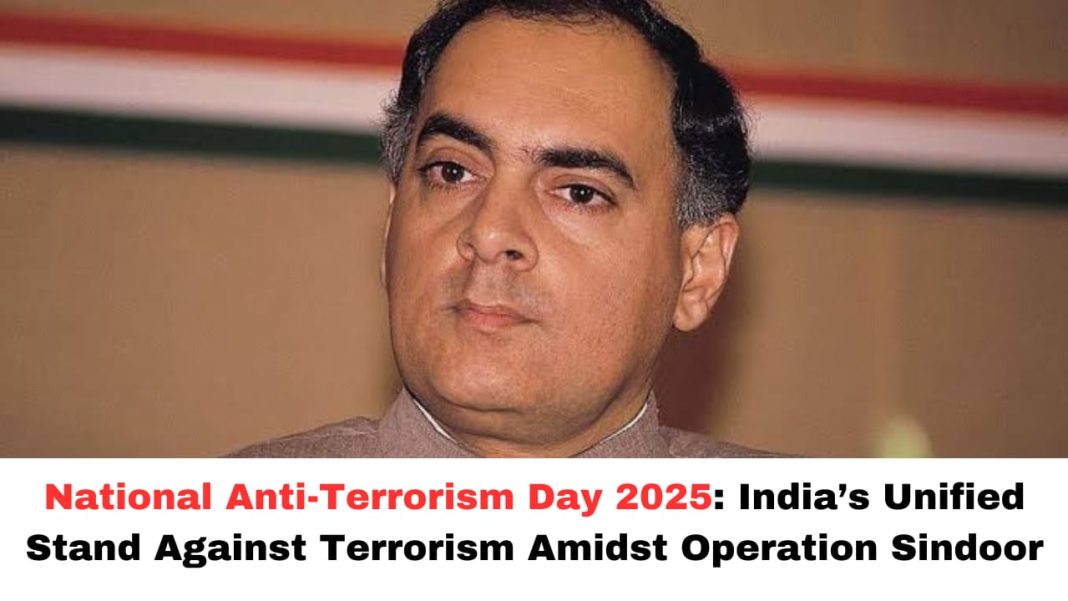Digital News Guru National Desk:
On May 21, 2025, India observed National Anti-Terrorism Day, commemorating the assassination of former Prime Minister Rajiv Gandhi and reaffirming its commitment to combating terrorism. This year’s observance was particularly poignant, coming in the wake of the Pahalgam attack and India’s subsequent military response, Operation Sindoor.
Remembering Rajiv Gandhi: The Genesis of Anti-Terrorism Day
National Anti-Terrorism Day is observed annually on May 21 to honor the memory of Rajiv Gandhi, who was assassinated in 1991 by a suicide bomber from the Liberation Tigers of Tamil Eelam (LTTE) in Sriperumbudur, Tamil Nadu. The observance was instituted by the V.P. Singh government in 1992 to generate awareness about the dangers of terrorism and to promote national unity and peace.

Government institutions, public sector units, educational institutions, and NGOs across the country organized pledge-taking ceremonies, debates, lectures, and seminars focused on the dangers of terrorism and violence.
The Pahalgam Attack: A Catalyst for Action
On April 22, 2025, a devastating terrorist attack occurred in Baisaran meadow near Pahalgam, Jammu and Kashmir, where terrorists targeted tourists, resulting in 26 deaths and over 20 injuries. The Resistance Front (TRF), an offshoot of the Pakistan-backed Lashkar-e-Taiba, claimed responsibility for the attack.
In response, India launched Operation Sindoor on May 7, 2025, targeting terrorist camps in Pakistan and Pakistan-administered Kashmir. The operation involved a series of 14 attacks over a 23-minute duration, utilizing advanced weaponry to dismantle terrorist infrastructure.
Operation Sindoor: A Strategic Response
Operation Sindoor marked a significant shift in India’s counter-terrorism strategy. The Indian Armed Forces targeted nine locations in Pakistani-administered Kashmir and Pakistan’s Punjab province, focusing on dismantling terrorist infrastructure without targeting Pakistani military establishments. The operation was described as focused, measured, and non-escalatory.
Vice President Jagdeep Dhankhar praised the success of Operation Sindoor, stating that the operation’s legitimacy and effectiveness were confirmed when the terrorists involved inadvertently exposed their own culpability.

International Outreach and Diplomacy
India’s commitment to combating terrorism extended beyond its borders. A government delegation, led by BJP Rajya Sabha MP Samik Bhattacharya, is set to visit France, Italy, Germany, Denmark, the UK, and Belgium to communicate the rationale behind Operation Sindoor and highlight Pakistan’s alleged support for terrorism.
Additionally, Indian Prime Minister Narendra Modi and German Chancellor Friedrich Merz reaffirmed their nations’ commitment to combating terrorism in all its forms during a conversation that also covered regional and global matters of mutual interest.
Cultural Reflections: Santosh Sivan’s “The Terrorist”
On this day, filmmaker Santosh Sivan reflected on his acclaimed 1998 film “The Terrorist,” which explores the psyche of a suicide bomber. Contrary to popular belief, Sivan clarified that the film was not directly inspired by Rajiv Gandhi’s assassination, though he acknowledged having witnessed the aftermath of the event. “The Terrorist” remains a significant cinematic work that examines the motivations and inner conflicts of individuals driven to commit acts of terror.
Civilian Impact and Humanitarian Concerns
While Operation Sindoor was hailed as a strategic success, it also brought to light the human cost of such conflicts. In early May 2025, the fragile peace in Indian-administered Kashmir was shattered by the worst violence in decades following the Pahalgam attack. India blamed Pakistan for the attack, leading to the deepest retaliatory strikes on Pakistani territory in over 50 years and escalating cross-border hostilities. Over four days of intense shelling and drone attacks, at least 27 civilians in India-administered Kashmir and 16 in Pakistan-administered Kashmir were killed, with hundreds of homes destroyed.

Conclusion
National Anti-Terrorism Day 2025 served as a poignant reminder of the sacrifices made in the fight against terrorism and the continuous efforts required to maintain peace and security. Through nationwide observances, cultural reflections, military operations, and diplomatic initiatives, India showcased its unwavering commitment to combating terrorism and promoting unity.
You May Also Read: Paresh Rawal Exits ‘Hera Pheri 3’, Legal Notice Issued








